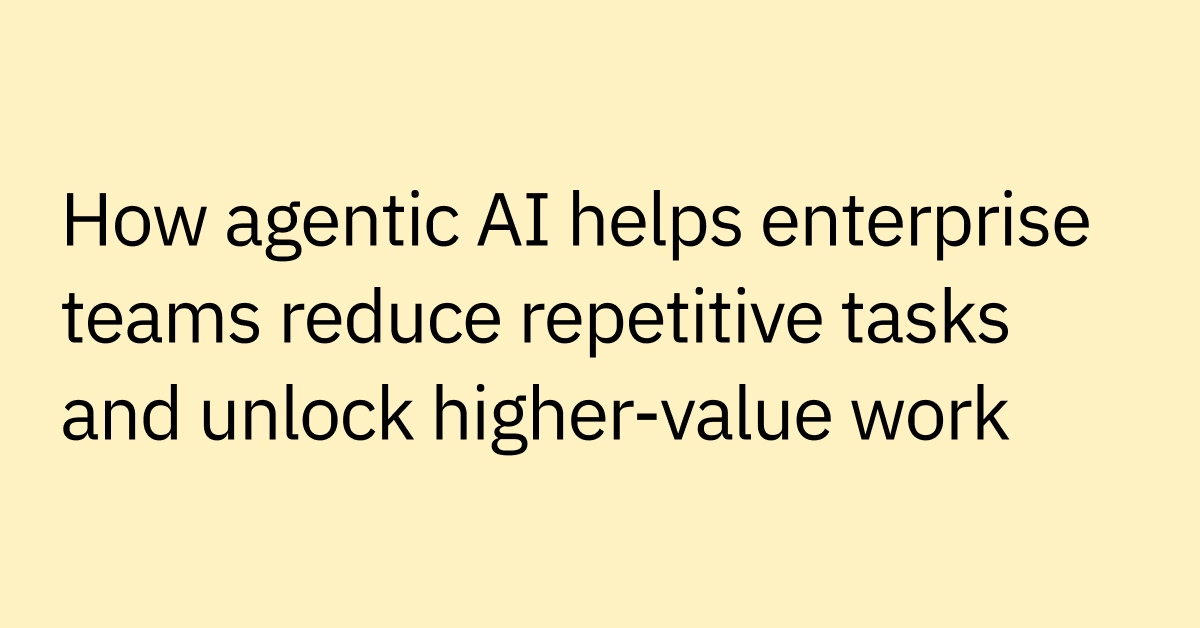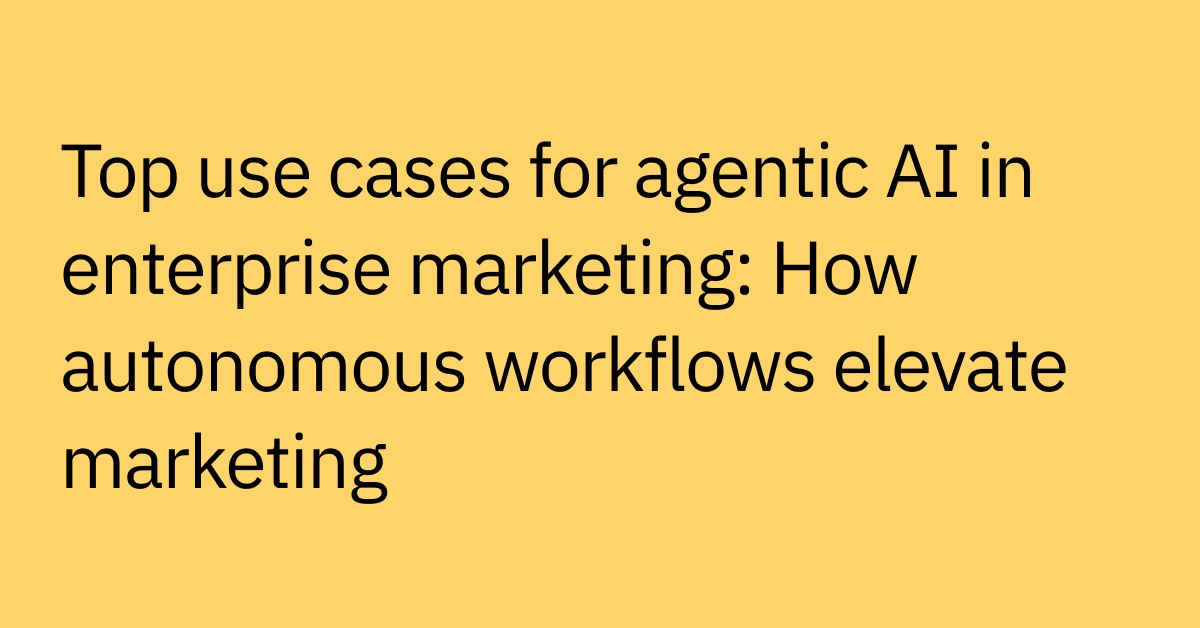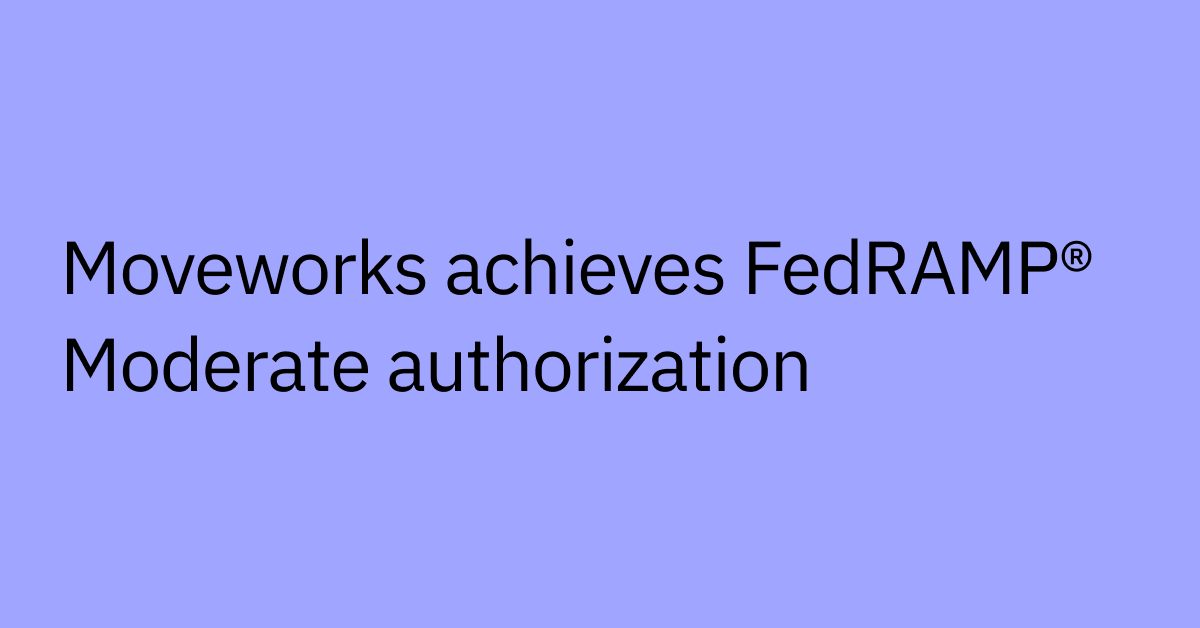Table of contents
After four jam-packed days immersed in the future of technology among thousands of peers and leaders at the 2023 Gartner IT Symposium | Xpo, I've distilled some key learnings that will prove critical for CIOs and technology strategists everywhere.
While much of the buzz centered around emerging innovations like generative AI and enterprise copilots, the most valuable takeaway was simple — technology is constantly changing, and it's what we do with it that matters. With the right vision and strategy, even bleeding-edge innovations can be harnessed to drive transformation and create real business value.
In the sessions and discussions, I witnessed dozens of examples of organizations already putting next-generation AI to work in impactful ways. For CIOs seeking to future-proof their organization amidst rapid change, I’ll share three key insights from the event, helping you to navigate the road ahead:
- We have reached an inflection point with generative AI. Enterprises have an unprecedented opportunity to deploy AI that can generate content, code, and creative assets to augment human work.
- Companies are progressing from AI experiments to production deployments. Speakers emphasized concrete use cases, quantifiable ROI, robust model governance, and specialized training data. They view AI as an enterprise-wide capability, not a one-off project.
- Enterprise copilots emerged as a prime use case. These AI assistants promise to boost knowledge worker productivity by handling routine tasks and workflows.
Generative AI is at the peak of its hype cycle.
Unsurprisingly, one of the biggest themes from the Gartner Symposium was the rise of generative AI and its impending impact on businesses. In the opening keynote, Gartner analysts proclaimed that we are entering a new era where AI gets integrated into everything people do, much like the arrival of the internet in the 1990s.
Gartner predicts that by 2030, 80% of people will interact with smart robots daily. While AI has been discussed for years, new advances in generative models like DALL-E and GPT-4 mark a profound shift in how humans and machines interact. We are moving from AI as a tool to AI as a teammate.
The payoff for companies strategically adopting generative AI will be substantial. Gartner outlined two primary opportunities:
- Everyday AI to enhance productivity and efficiency. Each company, department, team, and individual stands to gain from automating routine work, but these gains may not confer sustained competitive advantage since these tools will be widely adopted.
- Gamechanging AI that enables entirely new business models, products, and revenue streams. This AI has the highest expense and reward — it can upend organizations and entire industries.
However, Gartner cautions that organizations must move beyond the hype. Out of the 77% of executives focused on "everyday AI" for productivity gains, very few have an AI strategy in place. Only 9% of companies have defined a vision and principles for AI implementation, which will be much needed for the more risky, game-changing AI applications.
This is all to say that — regardless of the AI opportunity — CIOs must take steps to get ready within their IT infrastructure and core systems, including curating high-quality datasets, implementing tighter data governance, addressing model bias, and creating security protocols to manage new attack vectors like prompt injection.
Organizations that can harness AI as a core competency will gain a substantial competitive advantage. But CIOs must lay the groundwork today, pilot use cases that drive tangible business outcomes, and partner with the rest of the C-suite to make change happen.
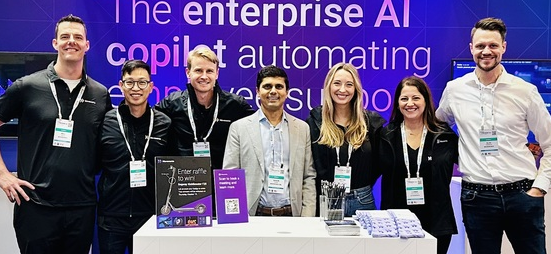 Figure 1: The Moveworks team at Gartner IT Symposium | Xpo.
Figure 1: The Moveworks team at Gartner IT Symposium | Xpo.
Companies worldwide are operationalizing generative AI.
While generative AI grabs headlines, many companies struggle to extract real business value beyond the hype. However, leading enterprises are making AI operational by taking a strategic, outcomes-focused approach.
According to Gartner, over half — 55% — of IT leaders have adopted some form of AI. Clearly, adoption is accelerating rapidly, as only 36% of companies reported having deployed AI mere months ago in April 2023.
Major companies like Hearst, Toyota North America, and Warner Music Group are putting this technology into practice, using AI to drive improvements in customer service, marketing, employee support, and other business priorities. AI has become an integral part of core operations for these industry leaders.
However, successfully leveraging AI requires identifying high-impact use cases tied to concrete goals. Gartner outlined a 6-step deployment process:
- Understand: Identify and prioritize the use cases in customer service, IT, HR, sales, and marketing that can drive productivity, cost reduction, and revenue growth in your unique organization.
- Develop: Conduct opportunity assessment and risk analysis. Design system architecture and define evaluation metrics. Analyze build vs buy trade-offs for horizontal vs. vertical applications. TL;DR: Quickly get your ducks in a row so that you can get the most value.
- Communicate: Get executive commitment and alignment across the organization on AI strategy. Communicate approach internally and externally.
- Implement: Build or acquire an AI platform for managing models enterprise-wide. Establish sandboxes to test applications.
- Manage: Mitigate risks like security, fairness, misuse. Iterate on apps through controlled testing.
- Govern: Continuously measure outcomes for each use case against predefined metrics.
The most successful organizations will recognize generative AI not as a discrete project but as an enterprise-wide capability supporting their most important business objectives. With the right strategy, governance, and focus on business outcomes, companies can move past the hype and make AI an integral part of their digital transformation.
Enterprise copilots power AI transformation.
Generative AI is already making an impact within forward-thinking enterprises. In a presentation by Moveworks founder and CEO Bhavin Shah, he explained how copilots are enabling support teams to drive transformation across four key areas:
- Employee impact: By automatically resolving common support issues like password resets and software provisioning, copilots are slashing IT ticket resolution times from days to minutes giving employees precious time back to focus on strategic work.
- Strategic impact: Copilots analyze ticket data at scale to uncover systemic issues — achieving insights impossible manually. With tools like Employee Experience Insights, leaders can identify and proactively fix pain points.
- Operational impact: Copilots optimize underutilized systems and reduce wasted spend by democratizing access to AI-powered workflows. With flexible low-code tools like Creator Studio, any rote process can be automated in minutes rather than months.
- Global impact: Multilingual copilots provide personalized, context-aware support in every language, eliminating the need for traditional translation techniques. Employees get the same high-quality experience anywhere in the world.
At their core, enterprise copilots are unlocking trapped potential — helping employees be more productive by eliminating digital frustrations and allowing IT teams to focus on high-value initiatives rather than repetitive tasks. The power of AI is here and now.
Of course, realizing these benefits requires change management and training. But make no mistake — we've reached an inflection point. With a thoughtful approach, copilots can complement staff to create an unprecedented impact starting today.
>> Learn how to build an AI copilot strategy that works for you. Download the enterprise copilot handbook!
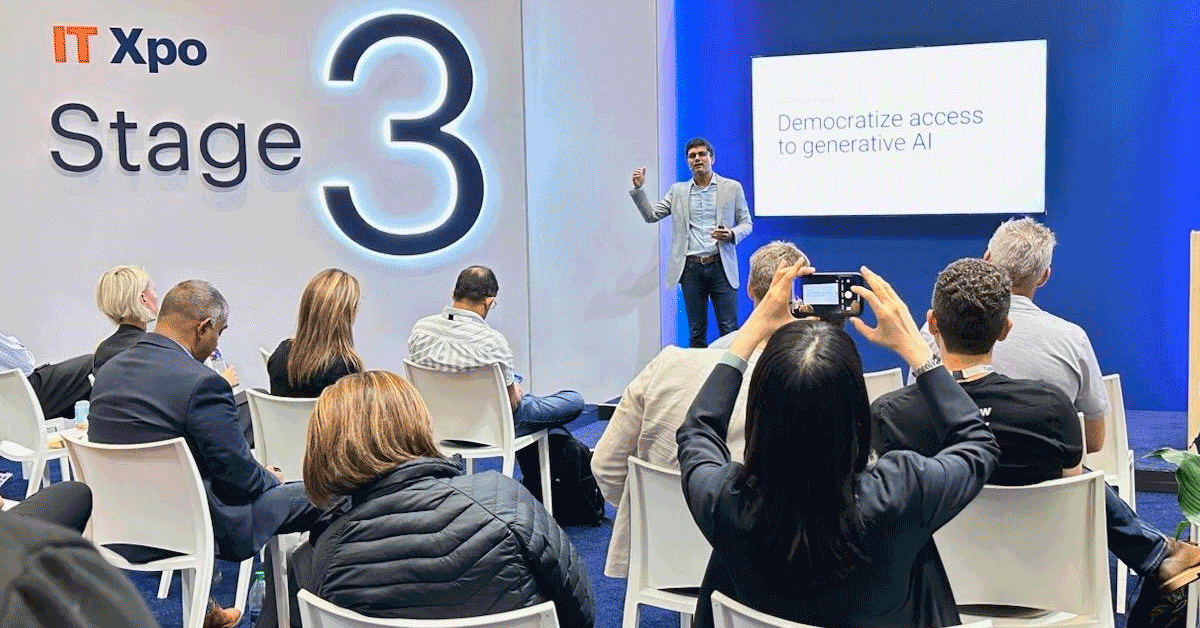 Figure 2: Moveworks founder and CEO Bhavin Shah presenting at the Gartner IT Symposium | Xpo.
Figure 2: Moveworks founder and CEO Bhavin Shah presenting at the Gartner IT Symposium | Xpo.
Moveworks realizes the promise of generative AI for the enterprise.
If you’ve made it this far, you know that the promise of generative AI is crystal clear — more intuitive interfaces, automated workflows, and frictionless information access.
Generative AI promises to eliminate digital drudgery, serving as an intelligent interface that synthesizes data and actions across siloed applications to empower employees. For employees who’ve wasted years toggling between disconnected systems and data silos, forcing constant context switching to complete basic work, this technology is a definite leap forward.
So, where does Moveworks fit in?
Moveworks provides a solution to enterprise application sprawl with a single conversational interface to every system. Natural language bridges these gaps, helping employees surface information, take action, and conduct structured data queries across their enterprise tech stacks.
Our platform offers out-of-the-box solutions for IT, HR, Finance, and other functions, as well as developer tools to build custom workflows. Under the hood, Moveworks leverages a grounded and fine-tuned stack of language models optimized on our data and workflows, allowing our copilot to understand employees' unique business contexts and seamlessly integrate with existing systems and data sources.
The Moveworks platform abstracts away the complexity of generative AI, handling training, implementation, security, and governance — key challenges discussed repeatedly at the Gartner IT Symposium | Xpo. This all-inclusive approach allows enterprises to rapidly scale AI while managing risks. With native integrations across applications, Moveworks serves as the connective tissue between systems.
As generative AI redefines work and software, Moveworks is enabling the next era of intuitive, conversational interfaces for the enterprise. Companies can finally escape application sprawl and let employees focus on high-value work. Moveworks allows organizations to deliver on the promise of AI today.
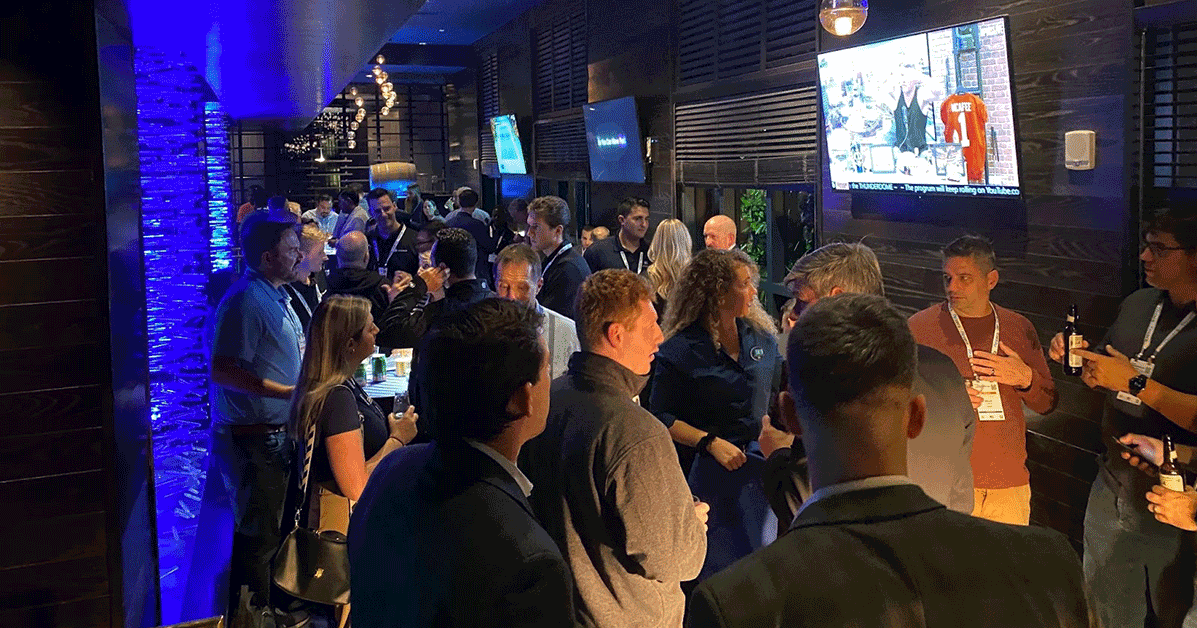 Figure 3: The room was packed at a Moveworks-sponsored happy hour at the Gartner Symposium | Xpo.
Figure 3: The room was packed at a Moveworks-sponsored happy hour at the Gartner Symposium | Xpo.
The future belongs to business who start using AI today.
After several days exploring the future of technology, the most practical guidance focused on actions you can take today. With the tools already available, it's possible to start generating real business value from AI.
With the right strategy and governance, companies can adopt AI to drive transformation, even within constrained budgets and tricky regulatory landscapes. It won't be easy. But if I learned anything from this event: You don't have to boil the ocean. Just start generating steam.
The businesses that will lead the future are those finding ways to make AI operational. They are partnering with vendors to implement AI copilots, automate help desks, and improve employee experiences today. These pragmatic steps compound over time into a true enterprise-wide transformation.
At Moveworks, we work alongside forward-thinking customers to make AI achievable. We know that the winners of tomorrow are taking steps to adopt AI today. With a strategic approach focused on near-term execution, a world of change is within reach. The time to operationalize AI is now.
The most innovative companies use AI. Learn how to build your AI copilot strategy.

